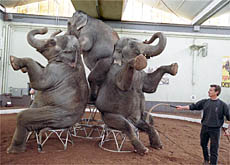Small circuses struggle to survive

The circus is a popular form of entertainment in Switzerland, with many new companies now competing against the big names.
But the circus tradition is in danger. Strict regulations and rising costs could force some smaller companies to stop touring or even close their doors completely.
A frequent complaint is that circus entertainment is not considered to have any cultural value and the Swiss authorities do not grant circuses concessions to help them operate.
“The main problem is that officials in Switzerland don’t consider the circus to be a form of culture,” Circus Monti director Johannes Muntwyler told swissinfo.
“Instead of benefiting from concessions, as our colleagues in neighbouring countries do, we have to fight against a growing number of conditions and regulations,” said Muntwyler, whose company employs 60 people.
Children’s entertainment
Alfred Reichle of the organisation, Swiss friends of the circus, agrees. “In western Europe people do not recognise that the circus is a form of culture, they tend to associate it with childhood, fun for children and light entertainment,” he said.
Circus Monti is one of the new generation which is challenging the dominance of the traditional Swiss circuses, such as Knie and Nock. More than a dozen companies now carry out regular summer tours. Sizes vary from 100-seat tents to those accommodating 2,500 people.
The Valentino circus is one of the smallest, employing just seven people. Director Valentino says his staff put in a 16-hour-day rehearsing and performing. (see video)
Reichle says the quality of Swiss circuses is very high in international comparison.
Swiss companies have to change their programmes continually because the small size of the country means there are fewer venues in which to perform. They have also had to develop their own distinctive style to mark themselves out from the competition.
Challenges
Muntwyler says that the number of circuses in the country ensures choice, but causes the smaller companies problems.
“Small, badly organised circuses often travel the country with no set tour plan and deliberately upset our itinerary,” he said. This problem did not arise with the larger companies, he said, which publicised their dates and venues in advance.
Even bigger challenges arise in complying with the strict regulations laid down by the authorities.
“The annual roadworthiness checks that circus vans have to undergo is a major expense,” Reichle said. “Every season they cover 3,000-5,000km, but a haulage truck would normally cover ten times that distance and the charge is the same.”
Another problem relates to the employment law. “The law prescribes that all employees, including artistes, have to have at least one weekend a month off,” Reichle pointed out, adding that talks were in progress to try to lift this requirement.
“For circuses this means either not showing the full programme on the busiest days of the week, or else closing for one weekend a month.”
Time to act
Muntwyler says politicians must act to ensure the survival of the country’s circuses.
“The politicians in Bern need to wake up, or circus will cease to exist in Switzerland,” he warned.
“Circus has to be considered a form of culture and accorded privileges, such as the abolition of the annual testing of the vans and exemption from heavy goods vehicle tax,” he said.
“My hope is that the circus’s image among the authorities will improve, and that they will finally realise that we make an important contribution to the cultural life of the country.”
swissinfo
Circus Knie is Switzerland’s biggest and best-known circus.
Circus Nock is a modern, classical circus company.
Circus Monti is one of a new generation of circuses, and was founded 20 years ago.
The Swiss circuses range in size from the very small (100-seat tents) to the large (2,500 seats).

In compliance with the JTI standards
More: SWI swissinfo.ch certified by the Journalism Trust Initiative











You can find an overview of ongoing debates with our journalists here . Please join us!
If you want to start a conversation about a topic raised in this article or want to report factual errors, email us at english@swissinfo.ch.